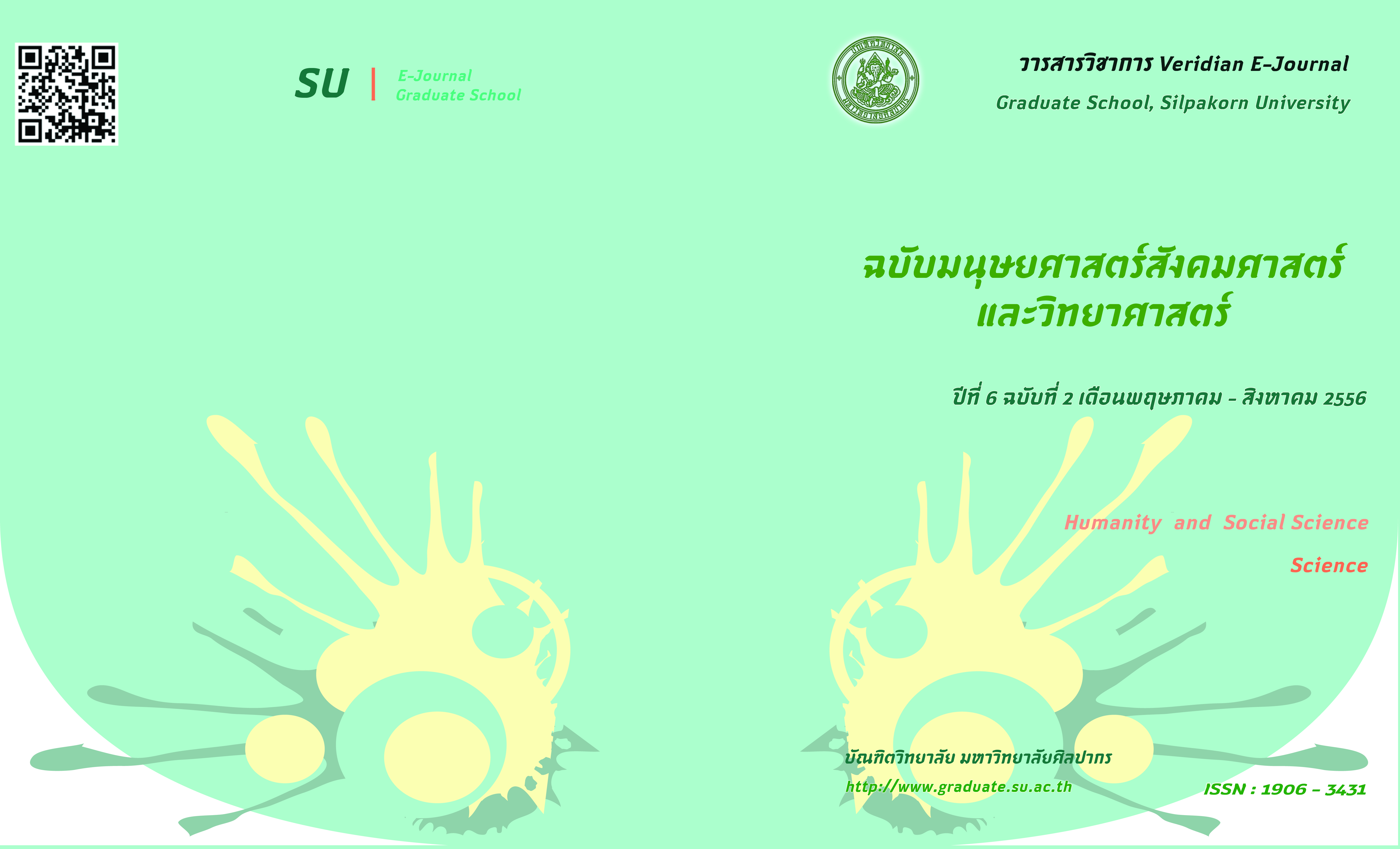การพัฒนาแบบฝึกเสริมทักษะการฟังภาษาอังกฤษเพื่อการสื่อสาร สำหรับนักเรียนชั้นมัธยมศึกษาชั้นปีที่ 4 โรงเรียนบัวหลวงวิทยาคม จังหวัดบุรีรัมย์
Main Article Content
Abstract
บทคัดย่อ
การวิจัยในครั้งนี้มีวัตถุประสงค์ เพื่อสร้างและหาประสิทธิภาพของแบบฝึกเสริมทักษะการฟังภาษาอังกฤษเพื่อการสื่อสาร เปรียบเทียบผลสัมฤทธิ์ในการฟังภาษาอังกฤษ และศึกษาความคิดเห็นของนักเรียนที่มีต่อกิจกรรมและแบบฝึกเสริมทักษะการฟังภาษาอังกฤษ
กลุ่มตัวอย่าง คือ นักเรียนระดับมัธยมศึกษาชั้นปีที่ 4 โรงเรียนบัวหลวงวิทยาคม อำเภอเมือง จังหวัดบุรีรัมย์ ภาคเรียนที่ 1 ปีการศึกษา 2555 โดยการสุ่มตัวอย่างอย่างง่าย จำนวน 40 คน เครื่องมือที่ใช้ในการวิจัย ได้แก่ แบบฝึกเสริมทักษะการฟังภาษาอังกฤษ จำนวน 8 บท แบบทดสอบวัดผลสัมฤทธิ์ในการฟังภาษาอังกฤษก่อนและหลังเรียนจำนวน 40 ข้อ และแบบสอบถามความคิดเห็นของนักเรียนที่มีต่อแบบฝึกเสริมทักษะการฟังภาษาอังกฤษ จำนวน 12 ข้อ
การทดลองและเก็บรวบรวมข้อมูลการวิจัย ดำเนินการทดลอง 4 สัปดาห์ สัปดาห์ละ 4 คาบ รวมเป็น 16 คาบ ก่อนการทดลองใช้แบบฝึกเสริมทักษะการฟัง ผู้วิจัยได้ทดสอบกลุ่มตัวอย่างด้วยแบบทดสอบวัดผลสัมฤทธิ์ในการฟัง หลังจากนั้นให้กลุ่มตัวอย่างทำแบบฝึกเสริมทักษะการฟังและทำแบบฝึกหัดท้ายบท พร้อมประเมินแบบฝึกเสริมทักษะการฟังด้วยแบบสอบถามความคิดเห็นที่กลุ่มตัวอย่างมีต่อแบบฝึกเสริมทักษะการฟังทั้ง 8 บทเรียน จากนั้นทำการทดสอบด้วยแบบทดสอบวัดผลสัมฤทธิ์ในการฟังอีกครั้งหนึ่ง ซึ่งเป็นแบบทดสอบฉบับเดียวกันกับแบบทดสอบก่อนการใช้แบบฝึกเสริมทักษะการฟัง และวิเคราะห์ข้อมูลโดยใช้สถิติ t – test แบบจับคู่ และวิเคราะห์ระดับความคิดเห็นของกลุ่มตัวอย่างที่มีต่อแบบฝึกเสริมทักษะการฟังโดยใช้ค่าเฉลี่ยและค่าเบี่ยงเบนมาตรฐาน
ผลการวิจัยพบว่า
1) ประสิทธิภาพของแบบฝึกเสริมทักษะการฟังเพื่อการสื่อสารมีค่าเท่ากับ 78.22/83.12 ซึ่งมี ประสิทธิภาพ 2) ผลสัมฤทธิ์ในการฟังภาษาอังกฤษเพื่อการสื่อสารของนักเรียนหลังเรียนสูงกว่าก่อนเรียนโดยใช้แบบฝึกเสริมทักษะการฟังอย่างมีนัยสำคัญทางสถิติที่ระดับ .01 3) นักเรียนมีความคิดเห็นอยู่ในระดับมากต่อแบบฝึกเสริมทักษะการฟังภาษาอังกฤษเพื่อการสื่อสารทั้งในด้านรูปแบบ เนื้อหาและกิจกรรม
Abstract
The purposes of this research were to: 1) construct and test the efficiency of English communicative listening exercises for Mathayomsuksa four students of Bualuangwitthayakhom School, Buriram, 2) compare students' English listening achievement before and after using the communicative English listening exercises, and 3) study students' opinions toward the constructed exercises.
The subjects consisted of 40 Mathayomsuksa Four students at Bualuang witthayakhom School, Buriram, selected by simple random sampling. The instruments used for this experiment were: 1) eight communicative English listening exercises, 2) an English listening achievement test, used as a pretest and posttest, and 3) a questionnaire used to survey the students' opinions on the English listening exercises.
The experimental process and data collection were: 1) the subjects completed the 40 item pretest listening achievement test before learning through the exercises, 2) the eight English communicative listening exercises were taught in 16 sessions, in four weeks of the first semester of academic year 2012, and 3) a listening achievement test and the questionnaire were administered. After all eight lessons had been used, the posttest was administered to measure the subjects’ listening achievement. The data were analyzed by percentage, mean, standard deviation and t-test.
The findings revealed that
1) The efficiency of the English communicative listening exercises was 78.22/83.12
2) The students’ listening achievement after using the eight exercises was significantly higher than before using the exercises at the .01 level.
3) The students’ opinions toward the eight listening exercises were positive.

